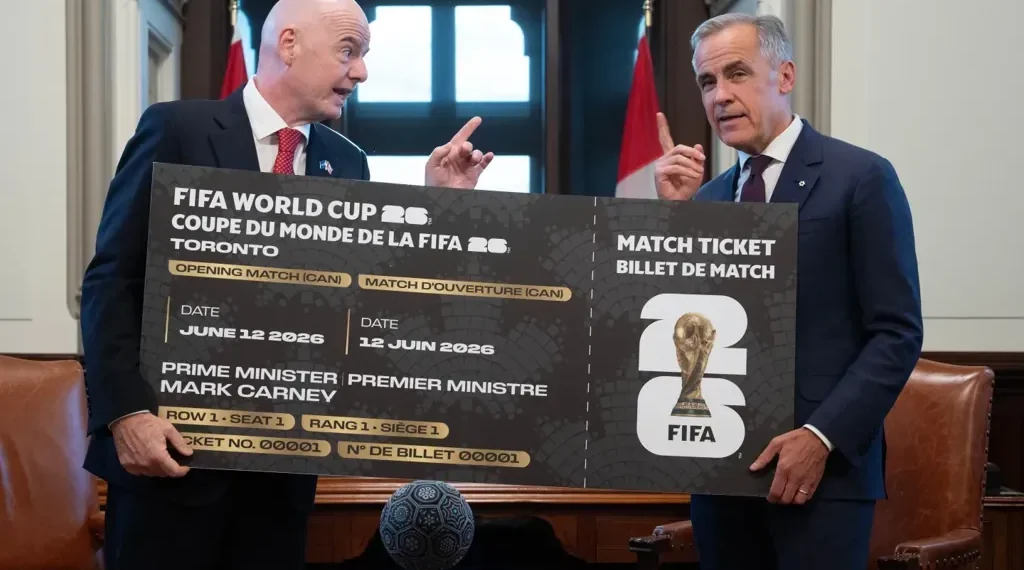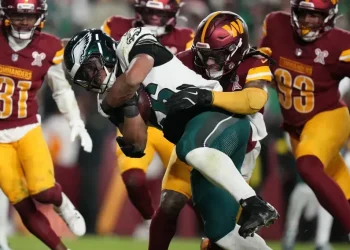Published: October 17, 2025, 21:30 EDT
More than one million tickets have already been sold for the 2026 FIFA World Cup, football’s largest global tournament set to take place across North America next year, according to an announcement by the sport’s governing body on Thursday. The early sales reflect high international demand even as teams continue to qualify for the expanded, 48-nation competition.
Massive Early Demand Across Continents
FIFA said buyers from 212 countries and territories have purchased tickets since sales began earlier this month, making it one of the strongest initial responses in World Cup history.
The highest demand came from host nations — the United States, Canada, and Mexico — followed by England, Germany, Brazil, Spain, Colombia, Argentina, and France. The tournament will run from June 11 to July 19, 2026, with matches across 16 cities in North America.
“As national teams compete worldwide for a place at this historic event, it’s thrilling to see fans showing such strong enthusiasm,” FIFA President Gianni Infantino said in a statement. “This is the most inclusive FIFA World Cup in history, and the response proves how deeply it resonates with football supporters everywhere.”
Ticket Resale Prices Reach Record Highs
FIFA also opened its official ticket resale platform, where seats for the World Cup final in East Rutherford, New Jersey, were listed between $9,538 and $57,500 per ticket as of Thursday afternoon.
The organization did not disclose detailed breakdowns of sales by venue or match, nor has it published an official grid of ticket prices — a practice followed in every World Cup since 1990.
Ticket Allotment and Lottery Draws
According to FIFA, the first sales phase involved a lottery system that drew 4.5 million applications, from which the first batch of ticket holders was selected.
A second sales phase will open on October 27, allowing fans to purchase single-match, venue-specific, and team-specific tickets for all 104 matches. Based on projected stadium capacities, approximately 7.1 million seats will be available across the tournament’s venues, though not all are expected to go on public sale.
The next draw phase will run from mid-November to early December, followed by a random selection draw after the final group-stage draw on December 5, once all teams have been confirmed.
Dynamic Pricing and Ticket Categories
For the first time in World Cup history, FIFA will implement dynamic pricing, meaning ticket costs will fluctuate based on demand and availability.
Seats are divided into four categories, with Category 1 offering premium views and Category 4 positioned higher in stadiums. Prices range widely, with the lowest tickets starting at $60 for select matches.
The U.S. opening match at SoFi Stadium in Inglewood, California, saw official prices between $560 and $2,735 when sales opened. On the resale platform, a single seat for that match was listed as high as $61,642, highlighting intense early market interest.
Political Concerns and Venue Security
FIFA’s sales update came amid comments from former U.S. President Donald Trump, who suggested earlier this week that he might reconsider certain World Cup venues — including locations in suburban Boston — if deemed unsafe under his administration.
The statement drew criticism from local organizers, who emphasized that all host cities had undergone rigorous FIFA security reviews.
Immigration and travel policy have also become flashpoints for international fans, with some concerned about visa access as the U.S. maintains tightened entry regulations.
Earlier this month, an international friendly between Argentina and Puerto Rico, originally planned in Chicago, was relocated to Fort Lauderdale, Florida, due to slower ticket sales that some attributed to these travel concerns.
Global Fan Engagement and Cultural Impact
FIFA’s leadership has promoted the 2026 World Cup as a celebration of unity and inclusion, marking the first tournament shared by three host nations. The event will feature 48 teams, expanding from the traditional 32-team format, and is expected to attract over 5 million international visitors.
Football analysts note that the U.S. market presents both logistical challenges and commercial opportunities. With matches spread across different time zones and ticket prices varying dramatically, the event represents FIFA’s largest-ever operational undertaking.
Luka Dončić Named Ambassador for Los Angeles Matches
In a bid to strengthen local engagement, NBA star Luka Dončić, a guard for the Los Angeles Lakers and native of Slovenia, was announced Thursday as an official ambassador for the Los Angeles leg of the tournament.
Dončić, who speaks four languages and is a longtime Real Madrid supporter, said he was honored to help promote football in his adopted city.
“I’ve always been a football fan,” Dončić said in FIFA’s announcement. “Los Angeles is a great city full of amazing people who love sports. I can’t wait for the World Cup — it’s an honor to help bring people together through a game that unites cultures across the globe.”
The Road Ahead for FIFA and Fans
As the countdown continues, FIFA has emphasized fan experience and accessibility as top priorities. Additional sales phases and hospitality packages will open in 2026, alongside sustainability initiatives and public transportation programs across host cities.
While logistical and political factors may influence the build-up, early indicators suggest record-breaking attendance and global engagement for the world’s most-watched sporting event.
This article was rewritten by JournosNews.com based on verified reporting from trusted sources. The content has been independently reviewed, fact-checked, and edited for accuracy, neutrality, tone, and global readability in accordance with Google News and AdSense standards.
All opinions, quotes, or statements from contributors, experts, or sourced organizations do not necessarily reflect the views of JournosNews.com. JournosNews.com maintains full editorial independence from any external funders, sponsors, or organizations.
Stay informed with JournosNews.com — your trusted source for verified global reporting and in-depth analysis. Follow us on Google News, BlueSky, and X for real-time updates.














